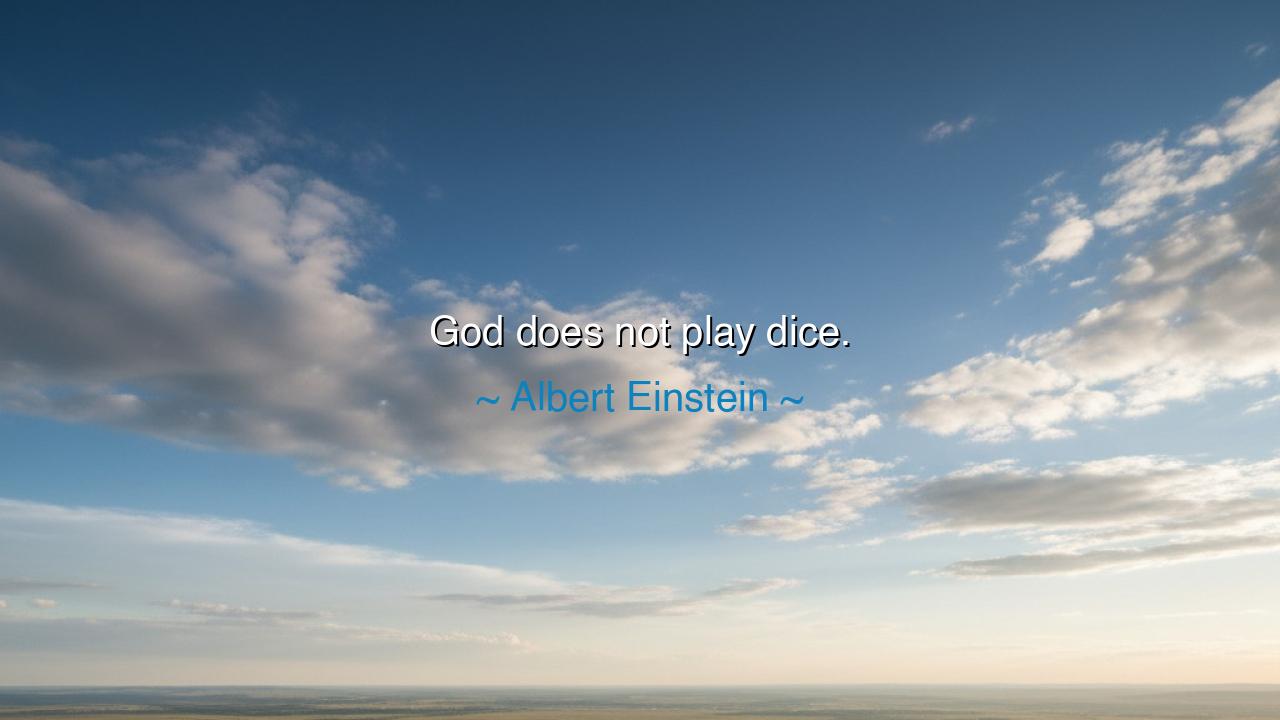
God does not play dice.






“God does not play dice.” Thus spoke Albert Einstein, that luminous mind who gazed into the machinery of the universe and saw not chaos, but order—not caprice, but law. In this short yet thunderous sentence lies the cry of a soul convinced that the Creator did not weave existence out of randomness, but out of reason and harmony. It was not a poet’s metaphor, but a physicist’s prayer: a declaration that behind every particle, every star, and every silent orbit, there beats a rhythm too perfect to be born of chance.
Einstein uttered these words in defiance, not against faith, but against a new breed of science that saw chance as the ruler of the cosmos. In the days when quantum mechanics first rose like a storm, its prophets—Bohr, Heisenberg, and others—declared that the universe was built upon uncertainty, that even the smallest specks of matter danced unpredictably. But Einstein, with his deep reverence for cosmic symmetry, resisted this vision. He could not accept that the hand of God—the ultimate mathematician—would cast dice to decide the fates of atoms. To him, the very beauty of nature testified to purpose, not probability.
The ancients would have understood him well. For they too believed that beneath the apparent disorder of storms and wars, there moved the secret order of divine wisdom. The philosopher Heraclitus spoke of the hidden harmony of opposites, and Plato taught that the world was shaped by the mind of the Demiurge, the divine craftsman who brought order from chaos. Even in the Scriptures, the psalmist sang that the heavens declare the glory of God, that the stars do not wander aimlessly but move as if choreographed by a silent composer. Einstein’s cry, “God does not play dice,” was not rebellion against modernity—it was the echo of an ancient conviction: that creation is not a gamble but a masterpiece.
Consider the life of Isaac Newton, the man who once looked upon a falling apple and discerned the laws that govern the heavens. Newton saw God as the divine clockmaker who built a universe of perfect balance and motion, a realm so precise that even angels would marvel at its symmetry. Like Einstein centuries later, he too believed that every force, every motion, every gleam of light followed an intelligible order. These men did not see science as the enemy of God, but as the language through which His mind could be read. And though Einstein did not worship as Newton did, his awe was no less holy. His “God” was the principle of unity—the eternal reason woven into the fabric of existence.
Yet there is a deeper truth hidden in the quote. When Einstein said that God does not play dice, he was also speaking to the human soul. For if the universe is not a game of chance, then neither are our lives. The trials that strike us, the moments that seem random or cruel, may conceal a pattern too vast for our eyes to see. What appears as coincidence may be providence in disguise. We, who live within the tapestry, cannot always discern its design—but faith, whether in science or in spirit, is the trust that order exists even when all seems uncertain.
And still, the humility of the wise reminds us that though God does not play dice, He may write in symbols too subtle for the human mind. The cosmos may not be random, but it is far from simple. Perhaps the dice we see are not truly dice at all, but keys—keys to mysteries still unopened. Einstein himself, though proud in intellect, was humble before mystery. “I want to know God’s thoughts,” he said, “the rest are details.” He believed that the human mind could glimpse the edges of divine reason, but never grasp it fully. To him, wonder was not ignorance, but worship.
So what lesson, then, should the children of today take from this ancient-sounding truth? It is this: do not despair in the face of the unknown. Whether in science, in suffering, or in the silence of your own heart, believe that order still reigns. Seek truth with courage, but seek it with reverence. Trust that the universe, like the soul, was made not for chaos but for meaning. For to live as though the world were chance is to drift without anchor; but to live as though God does not play dice is to walk in the confidence that purpose, though hidden, abides in all things.
Therefore, O seeker of wisdom, stand in awe of the cosmos, and let your awe turn into action. Study, question, discover—but never lose wonder. For in every law of physics, in every flicker of starlight, in every breath that fills your chest, there whispers the same eternal truth: God does not play dice, and neither has He played with your life.






AAdministratorAdministrator
Welcome, honored guests. Please leave a comment, we will respond soon